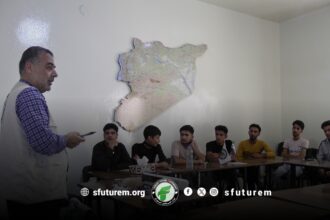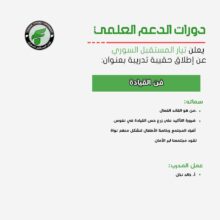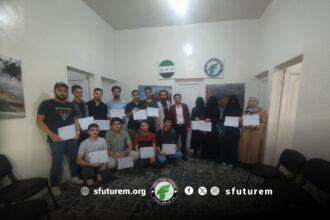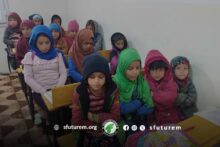Regarding the “Imagined Virginity”

The Imaginary Virginity
The topic of virginity and the hymen in Syria, as in many other societies, is surrounded by many myths and misconceptions that significantly affect the lives of women.
The hymen, which unfortunately we need to define scientifically to dispel its cultural mystique, is a thin tissue that partially covers the vaginal opening. However, it is not a definitive indicator of virginity, as the hymen can be torn for many reasons unrelated to sexual activity, such as sports, using tampons, or physical trauma like a fall from a height, among other reasons.
A Realistic Description:
In Syria, as in many Arab countries, the hymen is considered a symbol of virginity and honor, placing immense pressure on women to maintain it until marriage. This pressure can lead to virginity tests, a practice condemned by the World Health Organization as a violation of human rights. These tests can be painful and cause psychological and physical harm to women.
Due to the extreme importance placed on the hymen, there are now procedures known as “hymen reconstruction surgeries,” which are performed to rebuild the hymen before marriage. These surgeries are considered cosmetic, even though there is no scientific basis to prove their effectiveness in establishing virginity.
According to our follow-up in the Family Affairs Office with a number of gynecologists (20 in total) in northwest Syria, 7 of them have performed hymen reconstruction or stitching surgeries for humanitarian and religious reasons, fearing for the girl’s and her family’s reputation. While this might be good for maintaining civil peace, it contributes to building marital life on deceit and dishonesty.
It is important to raise awareness that virginity is a social concept, not a biological one, and there is no test that can definitively determine whether a woman has had sexual intercourse or not.
Awareness Efforts:
There are increasing efforts in Syria to educate people about the concept of virginity and reproductive health. Some organizations and initiatives are working to disseminate accurate information and debunk the myths surrounding virginity and the hymen. For example, Syrian Researchers have published educational articles explaining the structure of the hymen, clarifying that it is not a definitive indicator of virginity, and highlighting the real importance of reproductive health and how to maintain it.
The Syrian Feminist Lobby is also working to combat virginity tests, which are considered a violation of human rights, emphasizing that these tests are unscientific and cause psychological and physical harm to women.
These and other efforts aim to change misconceptions and promote a correct understanding of reproductive health and virginity, helping to reduce social pressure on women.
In Syria, as in many other countries, education on the concept of virginity and reproductive health in schools may be limited and heavily dependent on the curriculum and educational policies in place.
In official education available in some Syrian schools, topics related to reproductive health are included in science or health education curricula, where students are taught about the reproductive system and its functions. However, the topic of virginity and the hymen might not be addressed directly due to cultural and social sensitivities.
There are some initiatives by non-governmental organizations and awareness groups that aim to spread accurate information about virginity and reproductive health. These initiatives are often more comprehensive, addressing the myths and misconceptions surrounding virginity, and providing information about sexual and reproductive health in general.
Challenges in Numbers:
Education on these topics still faces significant challenges due to traditions and social customs that may consider discussing these topics taboo. This can lead to a lack of accurate information among young men and women, increasing the spread of misconceptions and social pressures related to virginity.
According to a survey conducted by our team at the Family Affairs Office of the Syrian Future Movement (SFM) in northern Syria, targeting 400 participants, the results were as follows:
- 65% and their families insisted on having the family present on the wedding night to verify the presence of hymen blood, confirming virginity.
- 77% believe that the hymen is a sign of a girl’s virginity and purity.
- 95% reject the idea of hymen reconstruction.
- 85% are unaware that the hymen can tear without sexual activity.
This survey highlights the need for sexual education and its importance, as well as the necessity of distinguishing between customs and traditions and religious practices that reject virginity tests and family surveillance of newlyweds on their wedding night. According to our research, we found no cases of separation or divorce due to the loss of virginity, as it appears that under the cover of social secrecy, no one would publicly admit to such a reason for divorce, primarily due to customs and traditions.
Conclusion:
There is no doubt that the insistence on considering virginity necessary for honor and chastity stems from moral values, reflecting our Syrian society’s emphasis on chastity. This is a positive aspect that should be mentioned and praised. However, we should not normalize the practical implications of this belief, as with the advancement of medicine and the availability of deceptive tools to address this issue, in addition to the fact that illicit sexual activity does not necessarily mean the hymen is torn, all of this makes the hymen an unreliable indicator of virginity. Keeping the hymen intact does not necessarily mean moral chastity, and tearing it does not mean it cannot be restored. Therefore, we recommend the following:
- The need to mobilize intellectuals and religious leaders to educate about women’s psychological and physical rights, without exaggerating an issue that could threaten women’s lives.
- The importance of distinguishing between promoting chastity and moral values, and linking these values to virginity.
- Giving special attention to women who have had their hymen torn without engaging in illicit sexual activity, providing them with psychological and cultural support.
Wehbe Al-Masri
Family Affairs Office
Qand Studies Section
Articles
Syrian Future Movement (SFM)






